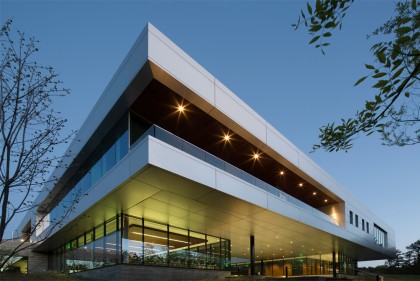Having started my career with several construction jobs working for building contractors, I have always had a keen interest in how the construction industry works. The movement to construction management a couple of decades ago has certainly changed the way buildings get built. Contractors are often primarily coordinators who self-perform little of the work, leaving the primary job of building to sub-contractors. The result can sometimes be a very balkanized job site where it is hard to ascertain an overall approach to creating the building. It is also hard for workers to feel the kind of pride in construction that existed when a single entity—their company–took the primary role of actually making the building.
By contrast, I am extremely impressed with work I recently observed by B.L. Harbert International, a construction company based in Birmingham, Alabama. I was on a trip to a very challenging building site in a developing country and had the opportunity to see first-hand how they work in the field.
In this project, Harbert is making extensive use of American materials, which are assembled in Alabama, then containerized and shipped, in just-in-time fashion to the job site. Clearly, they have to plan how the building is going to be built, to sequence it precisely, and to think through the entire construction process. I haven’t seen this methodology in ages, and it encourages me greatly to witness Harbert in action.
The amount of foresight is phenomenal. As a container arrives on the site it is dismantled and distributed to all of the various trades who need its contents. Then those same containers are often converted to workshop shelters for assembly of intricate mechanical and electrical systems.
There were 1,400 workers on this one building site. Harbert had its own employees, including some 200 ex-pats, and they self-perform a great deal of the job with a minimum of sub-contractors. They had hired hundreds of local workers, many of them unskilled when they came on the job.
Harbert has invested a lot in training these local workers. In that process, the workers have gained greatly increased skills, which they can use for the rest of their lives. Often, Harbert had to buy the workers shoes and work clothes and had to teach them fundamental notions of efficiency. There is a great deal of concern for these workers and a sincere desire to help them work better and more safely.
I was really impressed with how much the Harbert management is committed to the local workers. It’s clear they embrace these people as well as care about making a good product. The workers are well paid by local standards and Harbert gets solid results from their investment. Seeing Harbert organizing their workers, teaching them, and then getting good work out of them was really gratifying.
I’ve visited Harbert’s headquarters in Birmingham. Their offices are in an extremely well designed modern building. They clearly appreciate good architecture and are willing to put their money where there mouth is. They have great policies for employees: an on-site gym, running trails, fresh foods in the office, etc. It seems to be a very well run operation that really respects employees. Overseas, I observed the same sensitivity, directed over there to respect for local customs, attitudes and cultures.
It was a real joy to see such a sophisticated and efficient construction firm that cares about their people and takes great pride in building very fine buildings in very difficult circumstances.
